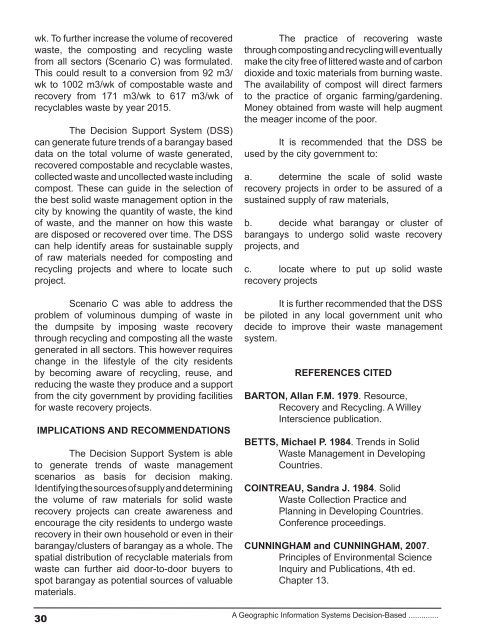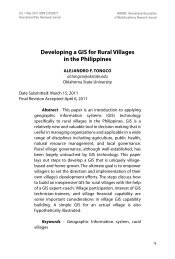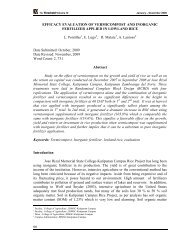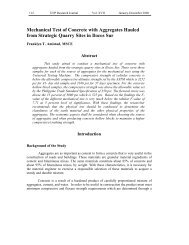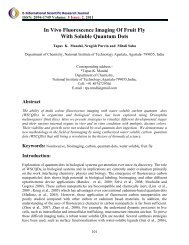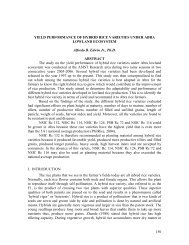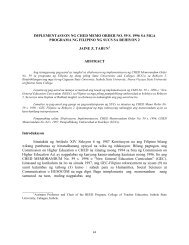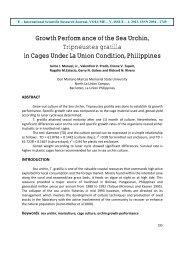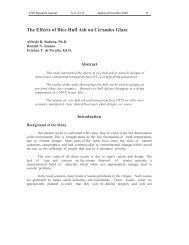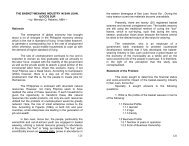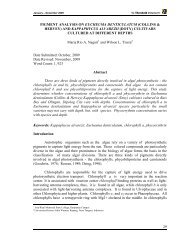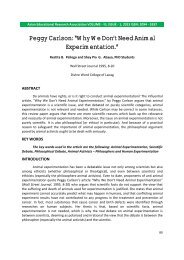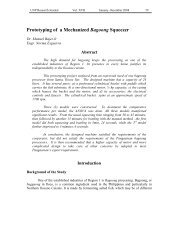download the full article here - EISRJC
download the full article here - EISRJC
download the full article here - EISRJC
Create successful ePaper yourself
Turn your PDF publications into a flip-book with our unique Google optimized e-Paper software.
wk. To fur<strong>the</strong>r increase <strong>the</strong> volume of recovered<br />
waste, <strong>the</strong> composting and recycling waste<br />
from all sectors (Scenario C) was formulated.<br />
This could result to a conversion from 92 m3/<br />
wk to 1002 m3/wk of compostable waste and<br />
recovery from 171 m3/wk to 617 m3/wk of<br />
recyclables waste by year 2015.<br />
The Decision Support System (DSS)<br />
can generate future trends of a barangay based<br />
data on <strong>the</strong> total volume of waste generated,<br />
recovered compostable and recyclable wastes,<br />
collected waste and uncollected waste including<br />
compost. These can guide in <strong>the</strong> selection of<br />
<strong>the</strong> best solid waste management option in <strong>the</strong><br />
city by knowing <strong>the</strong> quantity of waste, <strong>the</strong> kind<br />
of waste, and <strong>the</strong> manner on how this waste<br />
are disposed or recovered over time. The DSS<br />
can help identify areas for sustainable supply<br />
of raw materials needed for composting and<br />
recycling projects and w<strong>here</strong> to locate such<br />
project.<br />
Scenario C was able to address <strong>the</strong><br />
problem of voluminous dumping of waste in<br />
<strong>the</strong> dumpsite by imposing waste recovery<br />
through recycling and composting all <strong>the</strong> waste<br />
generated in all sectors. This however requires<br />
change in <strong>the</strong> lifestyle of <strong>the</strong> city residents<br />
by becoming aware of recycling, reuse, and<br />
reducing <strong>the</strong> waste <strong>the</strong>y produce and a support<br />
from <strong>the</strong> city government by providing facilities<br />
for waste recovery projects.<br />
IMPLICATIONS AND RECOMMENDATIONS<br />
The Decision Support System is able<br />
to generate trends of waste management<br />
scenarios as basis for decision making.<br />
Identifying <strong>the</strong> sources of supply and determining<br />
<strong>the</strong> volume of raw materials for solid waste<br />
recovery projects can create awareness and<br />
encourage <strong>the</strong> city residents to undergo waste<br />
recovery in <strong>the</strong>ir own household or even in <strong>the</strong>ir<br />
barangay/clusters of barangay as a whole. The<br />
spatial distribution of recyclable materials from<br />
waste can fur<strong>the</strong>r aid door-to-door buyers to<br />
spot barangay as potential sources of valuable<br />
materials.<br />
The practice of recovering waste<br />
through composting and recycling will eventually<br />
make <strong>the</strong> city free of littered waste and of carbon<br />
dioxide and toxic materials from burning waste.<br />
The availability of compost will direct farmers<br />
to <strong>the</strong> practice of organic farming/gardening.<br />
Money obtained from waste will help augment<br />
<strong>the</strong> meager income of <strong>the</strong> poor.<br />
It is recommended that <strong>the</strong> DSS be<br />
used by <strong>the</strong> city government to:<br />
a. determine <strong>the</strong> scale of solid waste<br />
recovery projects in order to be assured of a<br />
sustained supply of raw materials,<br />
b. decide what barangay or cluster of<br />
barangays to undergo solid waste recovery<br />
projects, and<br />
c. locate w<strong>here</strong> to put up solid waste<br />
recovery projects<br />
It is fur<strong>the</strong>r recommended that <strong>the</strong> DSS<br />
be piloted in any local government unit who<br />
decide to improve <strong>the</strong>ir waste management<br />
system.<br />
REFERENCES CITED<br />
BARTON, Allan F.M. 1979. Resource,<br />
Recovery and Recycling. A Willey<br />
Interscience publication.<br />
BETTS, Michael P. 1984. Trends in Solid<br />
Waste Management in Developing<br />
Countries.<br />
COINTREAU, Sandra J. 1984. Solid<br />
Waste Collection Practice and<br />
Planning in Developing Countries.<br />
Conference proceedings.<br />
CUNNINGHAM and CUNNINGHAM, 2007.<br />
Principles of Environmental Science<br />
Inquiry and Publications, 4th ed.<br />
Chapter 13.<br />
30<br />
A Geographic Information Systems Decision-Based ..............


